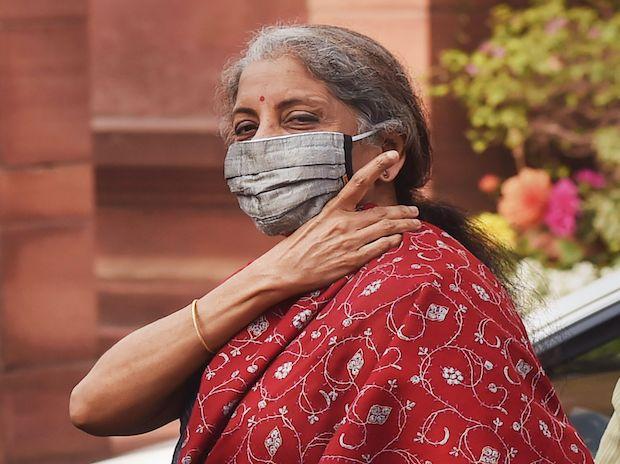Finance minister Nirmala Sitharaman on Friday said the Budget for 2021-22 will create a multiplier effect in the economy for achieving medium to long term sustainable growth.
“Instead of finding quick short term solutions...we are looking at also medium to long term sustainable growth, which will keep India in that kind of growth trajectory, which will maintain us as one of those fastest growing economies in the world,” Sitharaman said while replying to the general debate on the Budget 2021-22 in the Rajya Sabha.
She said the Narendra Modi government's priority, and the ruling Bharatiya Janata Party’s ideology is to take care of the people at the bottom of the pyramid and at the same time respect wealth creators and taxpayers. “Entrepreneurs in India have always shown their strength and achieved glories, and we should respect them rather than constrict them through all kinds of holding and regulations and providing of license,” she said.
Congress leader Rahul Gandhi had taken a dig at the government policy of promoting "crony capitalism", terming it "hum do humare do" at the lower house.
Amid protests by farmers over controversial farm laws, Sitharaman said the government has improved the balance sheet of Food Corporation of India that’ll help in MSP based procurements--by repaying loans that were due to National Small Savings Fund. FCI’s outstanding loans from NSSF are estimated to be reduced from Rs 3.39 trillion to Rs 1.19 trillion by March-end, and Rs 58,000 crore by end of next financial year, she said.
The government has also additionally provided Rs 2,500 crore for capital infusion into FCI, keeping it healthy to continue with its procurement and storage operations, she said.
The government should be accountable for the money it gets as tax, and therefore it has decided to make the budget more transparent. Onboarding the food subsidy is a classic case, she said.
“Something which I think will be reminded over and over again is bringing transparency in government's accounts, accounting for everything which is there,” Sitharaman said. “What you get as a Budget, is what is there in it; no pushing things under the carpet.”
Unlike her predecessors, who have called Budget numbers “suspect”, Sitharaman said there was an artificial increase in capital expenditure growth shown in 2007-08. An increase of 62 per cent was shown in capex which involved a fiscally neutral transaction of the government acquiring Rs 40,000 crore stake held by Reserve Bank of India in State Bank of India.
The government has admitted to a high fiscal deficit number and has given a glide path to lower the deficit without affecting or creating hurdles in the path to growth, Sitharaman said. The Centre's fiscal deficit would rise to 9.5 per cent of the country's gross domestic product (GDP) in the current financial year, according to revised estimates against 3.5 per cent pegged in the budget estimates. The deficit is slated to come down to 6.8 per cent next financial year.
She also said that giving stimulus for capital creating expenditure is one of the main features of the Budget coming after the pandemic.The stimulus is for revival, and systemic reforms which going to sustain India’s growth, ease of doing business, and sustain India as the leader in terms of entrepreneurial skills.
Pandemic Relief Measures
The government has provided Rs 2,567 crore which has been credited into EPF accounts for employee and employer contribution for those drawing salary up to Rs 15,000 per month. The amount was given to 3.9 million eligible employees’ accounts in 263,000 establishments, Sitharaman said.
The government’s initiative on paying employee contribution of EPF if companies hire the employees who lost their jobs due to the pandemic has also received a good response. About 146,000 establishments have registered and 775,000 new joinees, and 178,000 rejoined the workforce as on February one, the finance minister said.
As on February 10, about 9,100,000 MSMEs have benefitted from the Emergency Credit Line Guarantee Scheme, with the total amount sanctioned being Rs 2.43 trillion, of which Rs 1.78 trillion has already been disbursed, she disclosed.
 Dear Reader,
Dear Reader,
Business Standard has always strived hard to provide up-to-date information and commentary on developments that are of interest to you and have wider political and economic implications for the country and the world. Your encouragement and constant feedback on how to improve our offering have only made our resolve and commitment to these ideals stronger. Even during these difficult times arising out of Covid-19, we continue to remain committed to keeping you informed and updated with credible news, authoritative views and incisive commentary on topical issues of relevance.
We, however, have a request.
As we battle the economic impact of the pandemic, we need your support even more, so that we can continue to offer you more quality content. Our subscription model has seen an encouraging response from many of you, who have subscribed to our online content. More subscription to our online content can only help us achieve the goals of offering you even better and more relevant content. We believe in free, fair and credible journalism. Your support through more subscriptions can help us practise the journalism to which we are committed.
Support quality journalism and subscribe to Business Standard.
Digital Editor

RECOMMENDED FOR YOU